When I was younger, I was a trouble maker.
I think it came from prioritising my happiness above other peoples’ and being curious to see what the outcomes of my actions would be. For ex, in kindergarten my parents would meet with my teacher every day after school because I started a fight, wasn’t raising my hand to talk, didn’t focus on activities, etc.
I was too focused on being happy right now to think about the outcomes of my actions. After the damage was done, I would feel horrible but forget about that feeling and do it again the next day. My mom figured out a way to make me reflect on my actions — she would ask:
“What are the 3 things you want people to say about you at your funeral? Do you think they would say those things about you if you died today?”
I wanted people to say that I was:
- Kind
- Driven
- Fun to be around
And none of those reflected my actions, so I started to change. I started to pause before doing mischievous things to think about the outcome on peoples’ perception of me. It wasn’t long till I changed my habits completely.
Today I don’t think there are only 3 things I want people to say about me when I die — I think there are a lot more. I made a list of all the things I think make an ideal person.
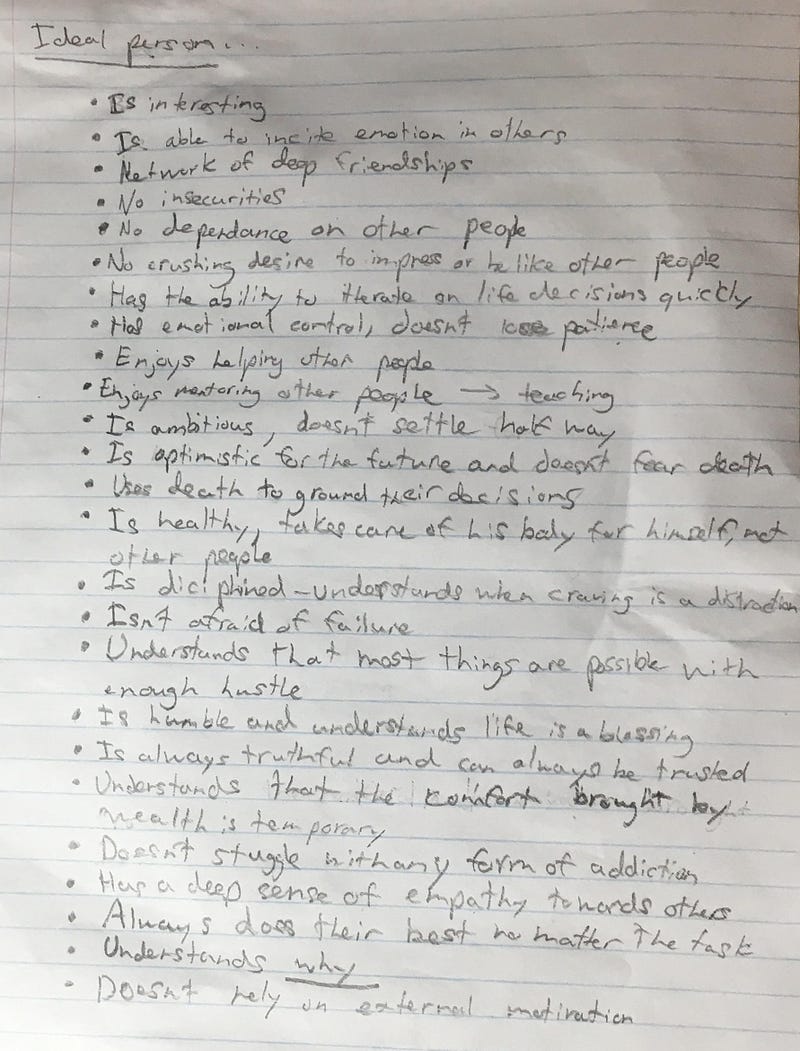
Which can be generalised as:
- Has emotional control
- Isn’t a slave to external factors
- Understands themselves and the cause of their actions
- Cares deeply for themselves and for others
- Is ambitious
- Is optimistic
Understanding what I want to become -> understanding how I'll become.
Your character is the result of an accumulation of experiences. Your experiences are interpreted by your desires. A positive experience is the outcome of experience aligning with desire. A negative one is the outcome of experience not aligning with desire.
Experience is easier to control than desire. Desire arises naturally as an outcome of emotion, but experience is usually voluntary.
So, understanding what you desire is the best way to understand what your experience should be. Right now, I’m at a crossroads. Should I go to XYZ university, take a gap year, work at a startup, get a PhD, etc? There is a seemingly infinite amount of choices I could make, but only a finite amount of choices align with my desire of an ideal person — I just need to figure out what those are.
Hierarchy of Desire
Desire shapes the interpretation of experience, but is also the outcome of experience. Your emotional response to an experience dictates how much you desire it.
As you experience more, desire reaches a local minimum where you understand what your priorities are relative to your environment. If you could experience everything there is to experience, you could theoretically reach a global minimum.
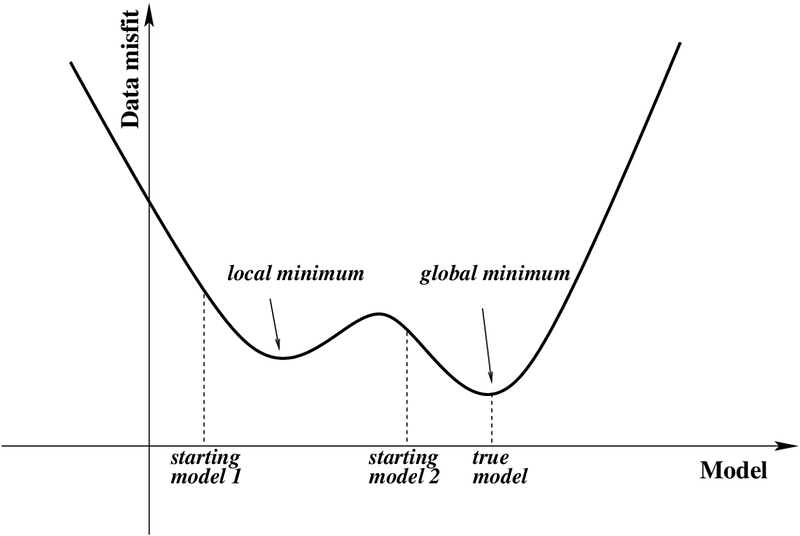
Experience passed on through many millennia of generations (through stories and genetic influence) have conditioned us to desire things hierarchically.
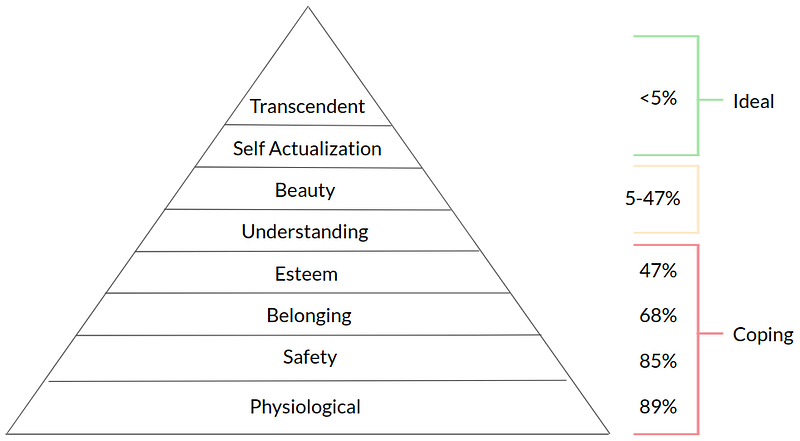
- The first block is primary needs. If someone does a “bad” thing, like stealing or putting another person down, it’s because their primary stack isn’t fulfilled. 11% of Canadians struggle with food insecurity and can’t even hit the first block.
- You can only feel a high sense of esteem once you feel a sense of belonging to a community. It makes sense —esteem is the feeling that you’re valued, and value comes from the benefit your actions have on other people, which can only be nurtured when you’re immersed in a trustworthy community.
- Seeking understanding and beauty (in nature, in art, etc) are forms of value extraction.
- Self actualisation and transcendent needs are hand in hand. Transcendence is feeling personally fulfilled and wanting to now focus on helping other people. Self actualisation (feeling like you’re making the right decisions with the right intentions) relies heavily on how much value you’re adding to other people. If other people aren’t benefiting from your actions, you probably won’t feel self actualised.
Lower level needs tend to give quick and intense feelings of happiness. They are priority #1 so our bodies have evolved to make us feel especially happy when we accomplish them, but only for a short time. When focusing on primary needs, we have a large margin of potential happiness and a low general state.
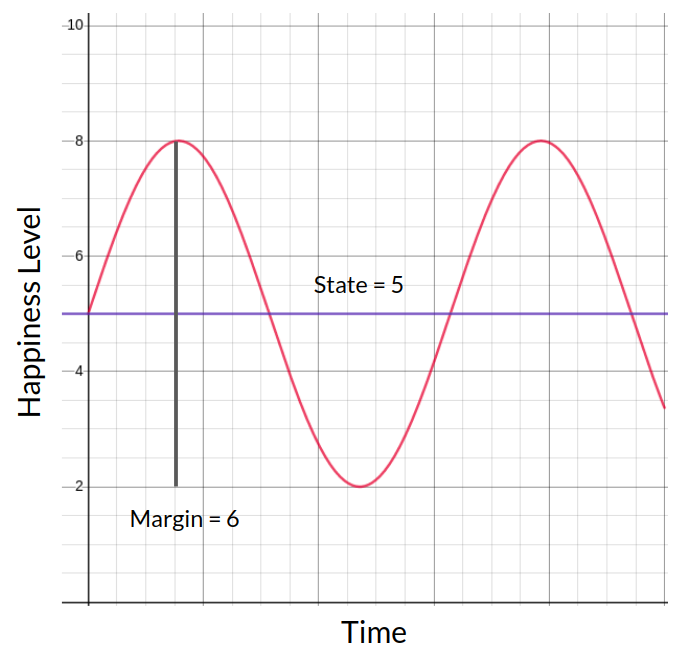
Higher level needs increase our happiness state, not just our current level. They also lower the margin for positive and negative emotion, making us emotionally stable.
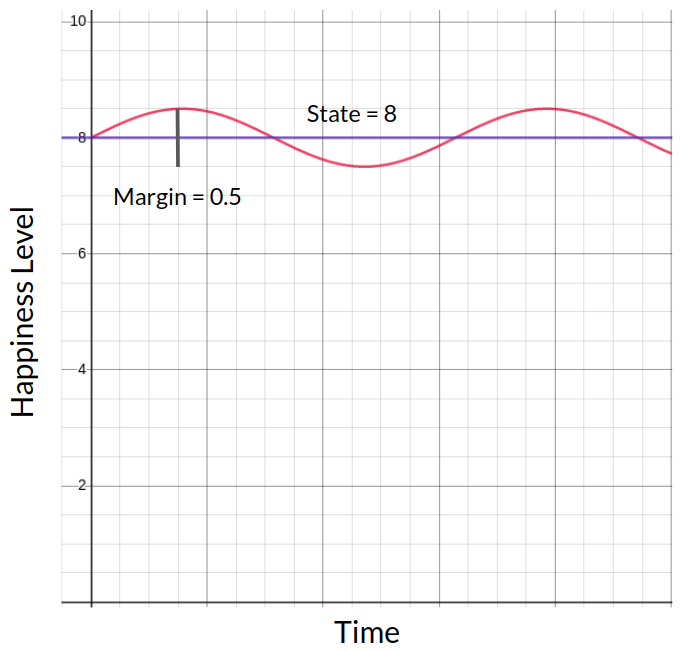
The traits I outlined for what I think is an ideal person fall into the hierarchy like this:
- ✖ Physiological
- ✖ Safety
- ✖ Belonging
- ✔ Esteem : (2) Isn’t a slave to external factors, (4) Cares deeply for themselves
- ✔ Understanding + Beauty : (1) Has emotional control, (3) Understands themselves and the cause of their actions
- ✔ Self Actualisation + Transcendent need : (4) Cares deeply for others, (5) Is ambitious, (6) Is optimistic
I'm lucky enough to be born in Canada. The first 3 blocks have pretty much always been satisfied.
I'll base my next long term experience off how it aligns the last three, not off how it makes me or feel in the moment.
If you don’t know who you are and who you want to be, you’ll become what other people want you to be. Your desire will be out shined by other peoples’ desire for you. Use a top down framework to figure out what you should do. Let me know if it works.